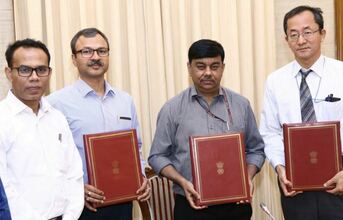
The Asian Development Bank (ADB) and the Government of India today signed a $120 million loan agreement to complete double-tracking and electrification of railway tracks along high-density corridors in India and improve operational efficiency of the country's railway networks.
The $120 million financing is the third tranche of a $500 million financing facility for the Railway Sector Investment Program approved by ADB's Board in 2011. The loan amount will be used to complete the on-going works started in the project's first two tranches.
The agreement was signed by Kenichi Yokoyama, ADB Country Director for India, and Sameer Kumar Khare, Joint Secretary (Multilateral Institutions) of the Department of Economic Affairs in the Ministry of Finance, at a ceremony in New Delhi.
"The program will help develop energy efficient, safe, and reliable railway systems that will result in reduced travel time along project rail routes and also reduce annual accident rate," said Khare.
"Funding for the project's third tranche will contribute toward achieving the overall program outputs of double-tracking about 840 kilometers (km) of rail routes and electrification of 640 km of tracks along high density corridors," said Yokoyama. "The program is also helping implement new accounting systems and provide additional safety measures including collision avoidance equipment."
The investment program is targeting busy freight and passenger routes in the states of Andhra Pradesh, Chhattisgarh, Karnataka, Maharashtra, and Odisha, including the "Golden Quadrilateral" corridor that connects Chennai, Kolkata, Mumbai, and New Delhi. The doubling of rail sections is being implemented along Daund-Titlagarh section, Sambalpur-Titlagarh section, Raipur-Titlagarh Section, and Hospet-Tinaighat section, while electrification is being undertaken along the 641-km Pune-Wadi Guntakal section.
END


























